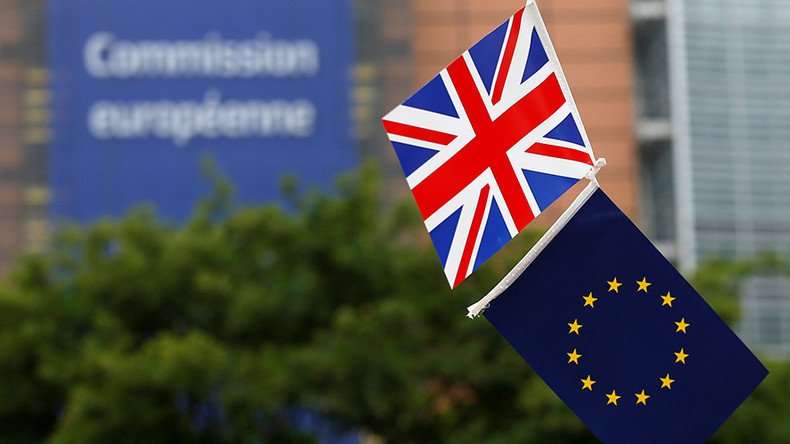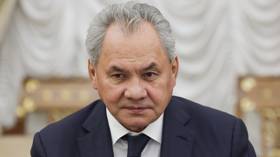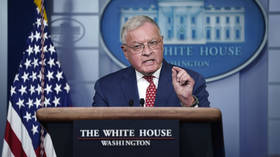More Brussels bureaucracy: ‘Brexit may take up to 10 years to implement’

The Tory party will drag its heels to leave the EU, says geopolitical analyst Patrick Henningsen. It has already announced that Brexit is probably not going to happen before the Conservative convention in October, followed by a change of leadership as well, he added.
US President Barack Obama, who paid a visit to Britain in April urging the country to stay in the EU, was one of the most vocal leaders against Brexit. The White House says it doesn't welcome the results of the UK referendum, but will accept the choice of the British people.
RT: Does the US actually lose out in any way because of Brexit?
Patrick Henningsen: They do. If you look back at the history of the European Union, the United States in a sort of covert fashion - initially anyway, post WWII - was one of the driving forces behind the creation of the European Union. And that has been learned through declassified documents and those are now publicly available. It is easier for the US to wield its foreign policy agenda by dealing with one central point of contact, rather than 28 odd different states on any major issue. So, certainly Washington would like to see the EU together and its special relationship with Britain makes that process all the easier when Britain has a major seat in Brussels.
RT: The US State Department says John Kerry wants to be part of the talks between London and Brussels. But is the Brexit process really any of Washington's business?
PH: That is very interesting if that is the case. The reality right now is that the Tory conservative party is dragging its heels on invoking Article 50, which once it is invoked would set in motion a two-year period of exits and then renegotiating Britain’s terms and conditions of that exit. They have already announced that it is probably not going to happen before the Conservative convention in October and then the change of leadership as well. David Cameron has already hinted this is something for the next conservative leader to do - be that Boris Johnson or Theresa May. So, they’ve already kicked the can down an additional six months. So, we are looking at an exit of a possibly five-year window. Some legal experts say it might be even longer than five years; it could be up to 10 years. We’ll see.
Remainers now grasping every piece of economic bad news like shipwrecked mariners reaching for flotsam
— James Delingpole (@JamesDelingpole) June 24, 2016
RT: An EU without Britain would arguably make the Union weaker. So would that actually make Europe more dependent on the US?
PH: That is an interesting point. I think from the US point of view, militarily this will be a big issue. NATO has already announced that they stand firm with the current set up and current relationship that includes Britain being at a center of NATO. However, talks of an EU military force, which have been going on behind the scenes for quite long time now, these agreements are already in place between many countries, this system of interdependency between various European militaries. So, it would be very interesting to see how that plays out. Certainly, that is something Washington would like to see in the future - an EU defense force deployed in countries. Also, Washington would like to see Turkey possibly as a member of the EU and that would extend the territory right down to the Middle East. So, from the military point of view, from the Pentagon point of view, from defense contracting profit point of view this could be a fantastic market for arms- and defense-related industries. So, that is one of Washington’s main interests. Plus, being able to wield its foreign policy through Brussels for sanctions against Russia, for instance, is very important for Washington.
Thorsten Polleit, economist and investor, Polleit & Riechert Investment Management told RT: “Given the market reaction following the publication of the decision… most investors were caught off guard. Most people wouldn’t have expected the Brits to leave the EU and that explains a lot why stock markets - and particularly the pound - has gone down so substantially. Overtime there will be a reassessment and in particular the prospects for Great Britain are much brighter than what market reaction tells us”.
RT: The euro and the pound took big hits. But does that help or hinder the dollar?
PH: What we saw is a flight of capital into what they call a perceived safety. People perceive the dollar as a stable haven for investments. So, what you saw – the markets reflected exactly that. You saw money transferred into dollar markets and also into gold, into hard money. So, that’s expected. In terms of the pound – devaluation of the pound at some point is not a bad thing for the British economy. There are a lot of benefits in tourism and also the export benefits as well. Fear mongering before the vote was: “The pound is going to free fall”. George Soros even laid a veiled threat against the Brexit voters. But that is not altogether a bad thing for Britain. And a devalued pound doesn’t hurt its balance of payments at home, paying for domestic services and benefits, which are done domestically anyway. So, I don’t think there are major shock waves there.
The statements, views and opinions expressed in this column are solely those of the author and do not necessarily represent those of RT.













